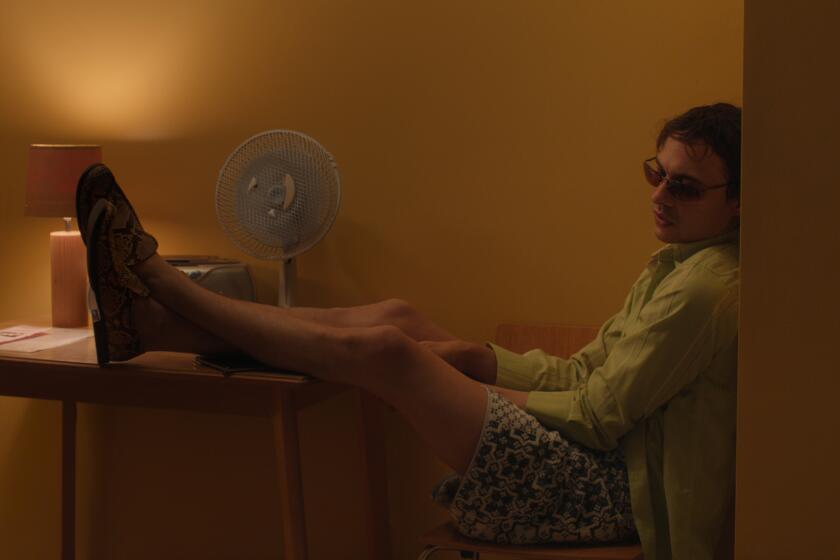She’s the driver at last
- Share via
It is unlikely that many filmmakers can lay claim to having once been Miss Illinois. Or, for that matter, to a past that includes regular roles on such durable daytime soap operas as “Days of Our Lives” and “The Guiding Light.”
For Karen Moncrieff, writer and director of “Blue Car,” the journey from pageants and soaps to lens and film speeds and release dates has been a long one. Her debut feature is about an 18-year-old swept into an emotional whirlwind by her parents’ divorce, her troubled younger sister, and the solace, direction and betrayal she receives at the hands of her poetry teacher. Anchored by the nuanced performances of newcomer Agnes Bruckner and indie veteran David Strathairn (for whom Moncrieff wrote his role), the film has a fragility like spun glass, shifting and turning as it proceeds.
Moncrieff, 39, describes her transformation with surprising candor and self-awareness. Born in California and raised in Michigan, she put herself through Northwestern University, in part with her pageant earnings. Setting out on a career in acting, she landed roles in soaps, TV shows and movies with titles like “Innocent Adultery” and “Midnight Witness.”
“The reason I started writing in the first place,” she says, “was I had become really frustrated with the things I was being offered as an actor.”
“If you look at my resume, I did a spate of ... B-movies and nighttime TV shows I didn’t watch, soaps I didn’t watch. So I was always vaguely embarrassed of the work I did, and my creative output didn’t really match my creative passion.”
She began to take extension classes in screenwriting, and eventually enrolled in the two-year certificate program at Los Angeles City College (which she completed) to learn the nuts and bolts of filmmaking. Her script for “Blue Car” would win the prestigious Nicholl Fellowship from the Academy of Motion Picture Arts and Sciences, as well as attract the attention of producer Peer J. Openheimer. Her makeover from actress to filmmaker was nearly complete. Though she had initially set out to write better roles for herself, she suddenly found she no longer felt the need to perform.
“Yes, I fully left it, happily left it behind,” she says. “I don’t cast myself because I don’t think I’m good enough. Honestly, I think I was fine as an actor, but I don’t think I was tremendous.”
For most of its running, it seems “Blue Car” might contain that increasing rarity in films, a relationship between an older man and a much younger woman that remains on the proper side of appropriate. When Straithairn’s character eventually makes his move on his young protege at a poetry competition in Florida, it is a devastating and unsettling twist.
Moncrieff is unapologetic for the discomfort the scene may cause audiences. “I wanted the audience to be very aligned with her, and invested in this guy like she is. So when things take the turn, you feel it like she does. Their relationship is a catalyst for serious growth for her, but it’s also a very dangerous thing.”
Frequently a first film, like the classic first novel, amounts to a veiled autobiography.
“I have had the question a lot,” she concedes, “and I pretty much always answer that the narrative elements are not autobiographical; however, a lot of elements in the movie are things I know personally. I didn’t have a younger sister who died; my parents were divorced; I didn’t sleep with my English teacher.”
Accompanying this is a wry expression and a small laugh, and repeated under her breath, “English teacher.” Continuing, she says, “I was never in a poetry competition, never hitched to Florida, never stole anything in my life. There’s a lot of imagination in the story, but there are parts of it that mirror things that I’ve struggled with or are things I’ve witnessed. I think the biggest part is my parents’ divorce when I was young, that defensiveness and loneliness. Some of the self-mutilation is something that I know about.... And I’ll leave it there.”
Since the premiere and Miramax’s acquisition of “Blue Car” at the 2002 Sundance Film Festival, Moncrieff has remained busy. She has adapted a script from the Martin Cruz Smith novel “Rose,” a period drama about coal miners in England, and is beginning to cast with an eye toward shooting in Romania in late summer or fall. She directed an episode of the popular HBO series “Six Feet Under,” titled “The Opening,” which aired Sunday.
In conversation, Moncrieff has the air of someone who has finally found her way after years of disappointment and perseverance. “Once I got behind the camera, it just felt like -- I don’t know if you’ve ever had the experience where you start to do something that you haven’t done before, and you thought you might like it, but it’s beyond what you imagined. You just love it and it feels like you are finally doing what you were meant to do -- like all your life you’ve been wearing someone else’s clothes, and finally you’ve put on some clothes that really feel like you.”
More to Read
Only good movies
Get the Indie Focus newsletter, Mark Olsen's weekly guide to the world of cinema.
You may occasionally receive promotional content from the Los Angeles Times.











